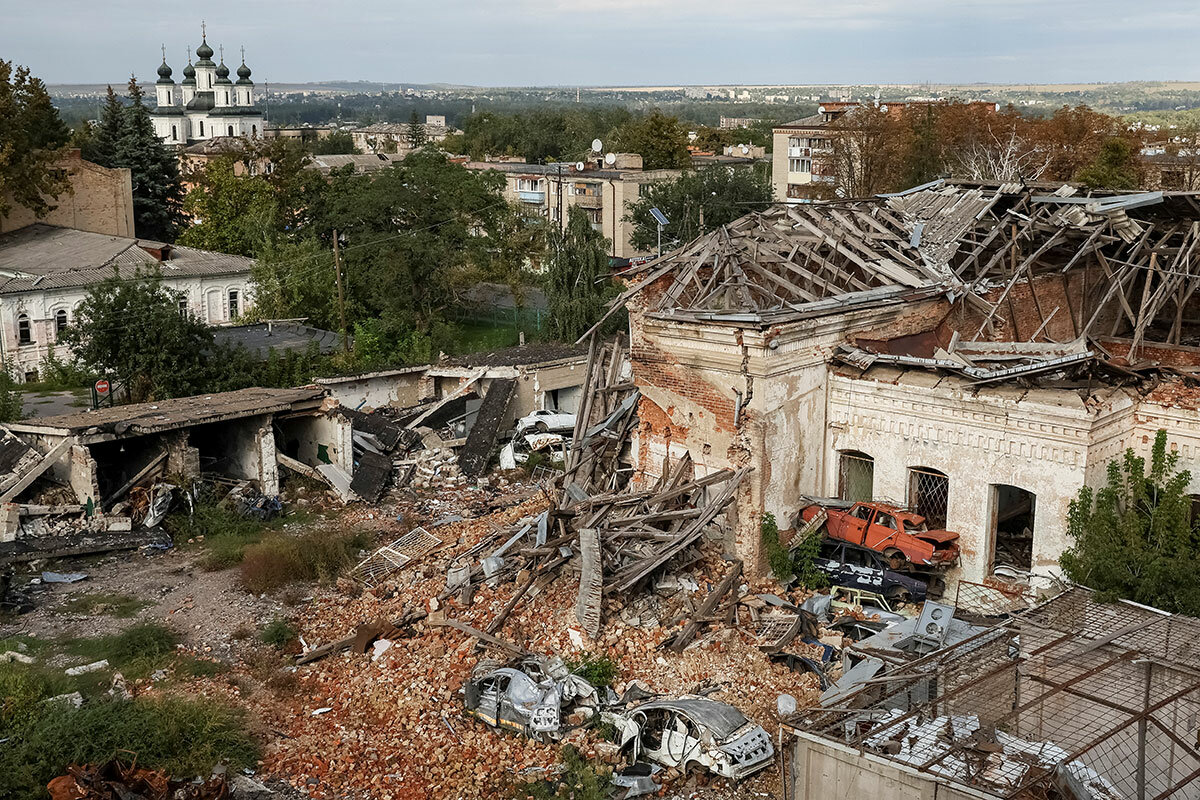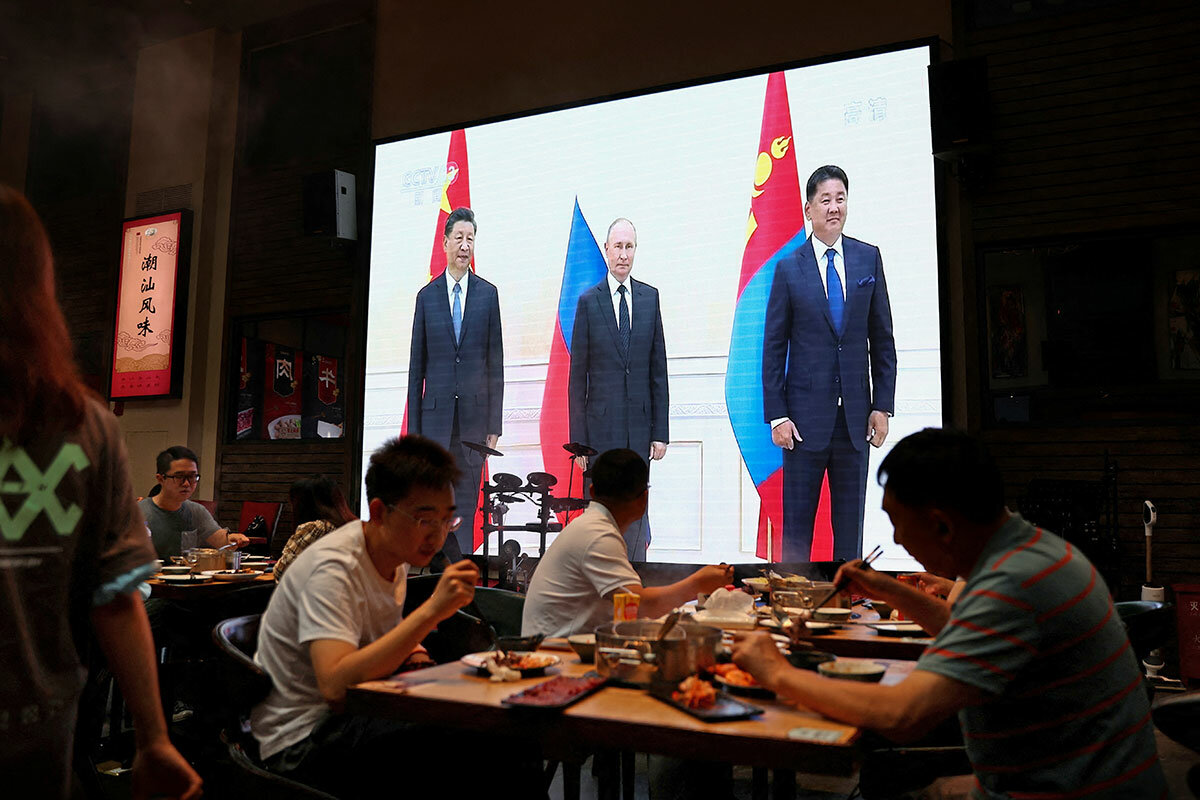For Russia, a geopolitical price for military setbacks in Ukraine
Loading...
| London
“Questions and concerns.”
Russian President Vladimir Putin’s startling acknowledgment that his key ally, China, harbored those misgivings over his war in Ukraine was just one sign that the price he is paying for his army’s setbacks is not just military.
There is a geopolitical cost too: The army’s failings have dealt a blow to his grand neoimperial ambition to reassert Russia as a major power on the world stage. The invasion of Ukraine was a crucial part of that plan.
Why We Wrote This
A story focused onRussia’s military setbacks in Ukraine have undermined President Putin’s standing with his allies and dealt a blow to his dream of reasserting Russia’s superpower status.
The effects reach beyond China. Narendra Modi, the prime minister of Asia’s other rising economic power, India, last week publicly upbraided the Russian president over the war.
Closer to home, former Soviet republics – from Azerbaijan to Central Asia – also seem to be recalculating their interests in response to a sense of Russia’s weakened ability to impose its political will.
The war is not over, and the prospect of an outright Ukrainian victory is, at the very least, distant. Mr. Putin’s announcement on Wednesday that he was mobilizing some 300,000 reservists was a reminder that he retains the capacity to launch renewed attacks on Ukrainian forces and to strike energy facilities and other critical infrastructure.
But Russia’s international heft has shrunk, and that seems likely to outlast whatever happens on the ground. And the more destruction Mr. Putin unleashes – especially were he to become the first leader since World War II to use a nuclear weapon – the more he weakens his international position.
His immediate worry is not that China, India, or the former Soviet republics will formally side with Ukraine against Moscow. They’re likely to remain “fence sitters,” having abstained on the United Nations’ post-invasion condemnation of Mr. Putin’s war.
Yet Mr. Putin knows that the view from the fence has changed dramatically, now that the war has gone on for far longer than expected, and involved Russian retreats in a number of areas.
So when he and Chinese leader Xi Jinping traveled to the Central Asian country of Uzbekistan last week for a summit of the Beijing-led Shanghai Cooperation Organization (SCO), he recognized how the war had weakened his position. Saying that he understood China’s “questions and concerns,” Mr. Putin was reduced to adding a note of thanks for its fence-sitting. Russia appreciated “the balanced position of our Chinese friends on the Ukraine crisis.”
He sounded less like the leader of a superpower and more like a supplicant.
And not a supplicant who necessarily gets what he wants. Even as SCO members were meeting in Samarkand, India’s U.N. representative briefly came off the fence to vote against Russia and in favor of allowing Ukrainian President Volodymyr Zelenskyy to address this week’s U.N. General Assembly remotely. In Samarkand, meanwhile, Mr. Modi bluntly told his Russian counterpart that “today’s era is not an era of war.”
India and China both have good reasons to retain close relationships with Moscow. For India, the benefits include arms and military equipment, as well as Russian oil.
China also imports critical goods from Russia. But its geopolitical interest in the alliance runs even deeper. In Mr. Putin, the Chinese leader sees a key ally in his bid to supplant the U.S.-led post-World War II international order.
Yet even before the Ukraine war, Mr. Putin was always destined to be the junior partner, if only because of China’s incomparably larger, more diverse, and more modern economy. Russia remains overwhelmingly dependent on exporting its natural resources, especially oil and gas.
The war, and the Western sanctions it provoked, have sharpened that imbalance, and the Chinese know it. So do the Indians. Witness the hard bargains Beijing and New Delhi have been driving to buy Russian oil at a steep discount.
The sense that Russia is less powerful, more distracted, and less trustworthy as an ally also seems to be seeping into a number of the former Soviet republics where Mr. Putin had hoped to spread Russia’s revived great-power influence.
Last week, Azerbaijan suddenly launched a new incursion into Armenia, rekindling the conflict over the disputed area of Nagorno-Karabakh. It seemed a bid to test Russia’s resolve; Moscow dispatched peacekeeping troops to Armenia after the last major fighting there and acts as a guarantor of Armenia’s security through a regional grouping called the Collective Security Treaty Organization (CSTO).
This time round, the Americans helped secure a truce, and when Armenia asked for CSTO military help, it got a fact-finding mission instead.
Other former Soviet republics in Central Asia also seem to be slipping from Moscow’s control. Fighting broke out last weekend between neighbors Tajikistan and Kyrgyzstan, for example. None seems likely to countenance anything like a break from Moscow. But, like the Chinese, they’ve largely avoided breaching the West’s economic sanctions on Moscow.
They are also drawing ever closer to China, their more powerful near neighbor.
And in the case of the two main energy economies in the area, Azerbaijan and Kazakhstan, there’s been a shift toward closer ties of a different sort – one decidedly unlikely to improve Mr. Putin’s mood.
They’re increasing their exports to the European Union.









